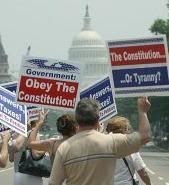What's Wrong with "Constitution" Day?
Two links to two great sources of education concerning the myth of "Constitutionality."
First Is Our Government Legitimate? by Laurence M. Vance. Here is a teaser and I dare you to follow the link and read the rest of it.
Buried in section 111 of Title I, "Miscellaneous Provisions and Offsets," of Division J, "Other Matters," in H.R. 4818, "Consolidated Appropriations Act, 2005," which became Public Law 108-447 on December 8, 2004, is the congressional decree that redesignates September 17th as Constitution Day and Citizenship Day instead of what was just Citizenship Day.
This law requires the head of each federal agency or department to provide:
- each new employee of the agency or department with educational and training materials concerning the U.S. Constitution as part of the orientation materials provided the new employee; and
- educational and training materials concerning the U.S. Constitution to each of its employees on September 17 of each year.
It also stipulates that "each educational institution that receives Federal funds for a fiscal year to hold an educational program on the U.S. Constitution on September 17 of such year for its students."
September 17th was so designated because it is the anniversary of the signing of the U.S. Constitution in 1787. In fact, this year is somewhat special because it is the 220th anniversary of that event. But what if, instead of being a cause for celebration, the adoption of the Constitution was "the most successful fraud in American history"?
The question, then, is a simple one: Is our government legitimate? I am not asking whether the U.S. government in its current state is legitimate based on its adherence to the Constitution. That it is not legitimate in that respect is obvious since the current government is about as far removed from the Constitution as it could ever be and still claim to be the government of a constitutional republic.
The Constitution was written by the delegates from twelve states to the Philadelphia Convention, which met from May 25 to September 17, 1787. It was debated and refined by some of the greatest political minds of the day. Some of the delegates had been members of Congress, some had written state constitutions, some had been state governors, and a few had even signed the Declaration of Independence or the Articles of Confederation. Three members of Convention were current members of Congress, including James Madison.
Correct, but is our government legitimate?
The Constitution was sent to the states for ratification on September 28, 1787. On December 7, 1787, Delaware became the first state to ratify the Constitution. The ninth state needed for ratification was obtained on June 21, 1788, when New Hampshire ratified.
Yes, but is our government legitimate?
After Virginia (on June 25, 1788) and New York (on July 26, 1788) ratified the Constitution, the Confederation Congress passed a resolution on September 13, 1788, to put the new Constitution into effect. The operation of the new government under the Constitution began on March 4, 1789.
All true, but is our government legitimate? MORE HERE
A TREATISE ON NATURAL LAW, NATURAL JUSTICE, NATURAL RIGHTS, NATURAL LIBERTY, AND NATURAL SOCIETY; SHOWING THAT ALL LEGISLATION WHATSOEVER IS AN ABSURDITY, A USURPATION, AND A CRIME.
Another teaser and link. If you are addled brained and squishy between the ears this may cause your indoctrinated and propagandized brain to hurt a little. Muddle on through it because it is the cure for what ails USAll.
THE SCIENCE OF JUSTICE.
Section I.
The science of mine and thine --- the science of justice --- is the science of all human rights; of all a man's rights of person and property; of all his rights to life, liberty, and the pursuit of happiness.It is the science which alone can tell any man what he can, and cannot, do; what he can, and cannot, have; what he can, and cannot, say, without infringing the rights of any other person.
It is the science of peace; and the only science of peace; since it is the science which alone can tell us on what conditions mankind can live in peace, or ought to live in peace, with each other.
These conditions are simply these: viz., first, that each man shall do, towards every other, all that justice requires him to do; as, for example, that he shall pay his debts, that he shall return borrowed or stolen property to its owner, and that he shall make reparation for any injury he may have done to the person or property of another.
The second condition is, that each man shall abstain from doing so another, anything which justice forbids him to do; as, [*6] for example, that he shall abstain from committing theft, robbery, arson, murder, or any other crime against the person or property of another.
So long as these conditions are fulfilled, men are at peace, and ought to remain at peace, with each other. But when either of these conditions is violated, men are at war. And they must necessarily remain at war until justice is re-established.
Through all time, so far as history informs us, wherever mankind have attempted to live in peace with each other, both the natural instincts, and the collective wisdom of the human race, have acknowledged and prescribed, as an indispensable condition, obedience to this one only universal obligation: viz., that each should live honestly towards every other.
The ancient maxim makes the sum of a man's legal duty to his fellow men to be simply this: "To live honestly, to hurt no one, to give to every one his due."
This entire maxim is really expressed in the single words, to live honestly; since to live honestly is to hurt no one, and give to every one his due. MORE HERE












